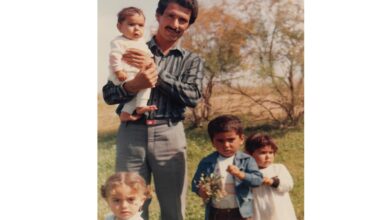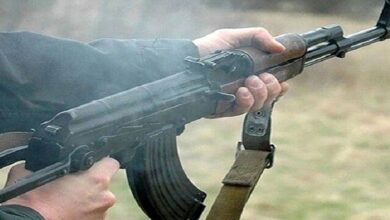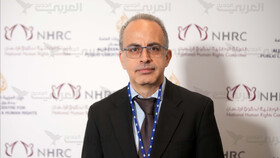Association for Defending Victims of Terrorism held “Responsibility of the International Community to Support Women Victims of Terrorism” side-event in collaboration with the Center for Research and Social Studies of the University of Tehran, Peace and Friendship Ambassadors, the World Association of Peace Lovers, on the occasion of International Women’s Day, during 49th session of the UN Human Rights Council at the Center for Social Studies of the University of Tehran with the participation of national and international figures and professors and women affected by terrorism.
Dr. Mahdi Moghadas, the moderator of the meeting, commemorating the memory of women victims of terrorism in his intervention said, “We hope that at the national, regional and international levels, the celebration of the status of women will go beyond naming a day and a slogan and witness fundamental changes in the real status of women in the international community.”
Next, Ms. Fatemeh Safaeipour Zamani, M.A. of Private Law, read a message from UN Secretary General Antonio Guterres on the occasion of International Women’s Day. In a part of the statement she read, “On International Women’s Day, we celebrate women and girls everywhere. But we also recognize that in too many areas, the clock on women’s rights is moving backwards. The pandemic has kept girls and women out of schools and workplaces. They face rising poverty.”
In another part of the message, the UN SG said that “Starting now, on International Women’s Day, it’s time to turn the clock forward for every woman and girl. Through guaranteeing quality education for every girl, so they can build the lives they want and help make the world a better place for us all. We need to turn the clock forward on women’s rights. The time is now.”
Then, Dr. Anicée Van Engeland, professor of Cranfield University of UK said aboutinternational capacities for empathy and the realization of the rights of women victims of terrorism, “Women are as vulnerable to terrorism as men are. When it comes to hearing the voices of terror victims, they are also an issue of gender equality.”
She added that governments should work together to strengthen women’s voices and ensure their rights are protected. Women victims of terrorism experience post-traumatic stress. Their rights, including the right to education and the right to health, are also violated as a result of terrorist incidents.
She said, “We need to think about women who have been victims of terrorism and who want to be involved in issues related to countering violent extremism and participating in the fight against terrorism,” she said. How can we give them freedom? One of their rights is the right to collective memory, and the victims of terrorism have the right to tell their own testimony.”
“In the end, we need to know that women victims have some kind of vulnerability that needs protection. This includes protecting women in conflict, displacement, and any other environment that is unsafe,” said the Cranfield University professor
Ms. Maryam Karimi, a women’s rights activist from Afghanistan, continued the meeting to speak about the media’s commitment to empowering women victims of terrorism, saying that women play the highest role in society and that any effort towards women in society can be sustainable in the future.
“Unfortunately, violence against women has no end, and the media must reflect the physical and psychological damage caused by violence and terror against women,” she said.
The women’s rights activist in Afghanistan went on to say that most media outlets focus on the issues and how they are happening, while the media should make the international community more aware of the aspects of the effects of terrorism on women. Because the media can play an important role in society in revealing the nature of terrorists and behind the scenes of terrorism and creating international solidarity and showing the truth about terrorism, as well as creating the necessary circumstances for justice.
Ms. Maryam Karimi concluded by saying that if the media helped the victims to realize their rights, the recurrence of the terrorist attacks would be indirectly prevented.
In another part of the meeting, Dr. Murteza Muheqi, a member of the faculty of the University of Gharjestan, Afghanistan, spoke about the international community’s plans regarding women victims of terrorism. He said that terrorism is a heinous act that causes terror and fear that kills innocent people, especially women.
The professor of Gharjestan University of Afghanistan further stated that non-governmental organizations such as the Association for Defending Victims of Terrorism are among the most important institutions that can work on establishing mechanisms to increase the level of support for victims. He added that in this regard, human rights education, hearing the voice of women victims of terrorism and hearing the sufferings of victims and providing employment, education and realization of victims’ rights and compensation for them, can be effective measures to reduce the negative effects of terrorism on society and especially women and girls.
Next speaker, Ms. Masoumeh Al-Kanani, PhD in criminal law and human rights activist in Iraq, stated that the lack of definition of terrorism has placed a wide range of phenomena in the context of terrorism and does not distinguish between terrorism and liberation movements. She went on to say that women in the Middle East, especially in Iraq and Syria, have suffered greatly from terrorist crimes.
Dr. Hamad Reza Sadeghi, a researcher at a university in Paris, described the international community’s efforts about the sufferings of women victims of terrorism, while listing the rights of women victims of terrorism in international documents and said Taliban have violated the rights of women in the worst way in the silence of international community and some cases took place in Balkh, Kunduz and Kabul. He further proposed the establishment of a fact-finding committee by the United Nations to document the facts and refer the findings to the International Criminal Court.
He also referred to the Taliban’s confession to carrying out 1,050 suicide attacks in Afghanistan, which no other group has had in the history of suicide bombings.
In another part of the meeting, Dr. Azam Ahangar, Director of Urban and Regional Studies, Institute of Social Studies and Research, University of Tehran, spoke about the realities facing women victims of terrorism and said, “Women victims of terrorism face with several physical and mental injuries.”
She continued that women victims of terrorism suffer from skill and movement limitations due to physical and mental injuries and their social activities are limited. Also, some of them undergo long-term treatment processes or in some cases for the rest of their lives.
Dr. Ahangar continued to say that isolation, permanent celibacy, depression, trauma, the crisis of acceptance and the suffering of widowhood and finally encountering the empty nest syndrome are cases that women victim of terrorism face.
Next, Ms. Farkhondeh Shafei, a veteran of Saddam’s chemical attack on the city of Sardasht who currently lives in Canada spoke about the incident on the day of the attack and the harms imposed on her and her family and said, “Not only international organizations but by every human being have a duty to oppose the use of chemical weapons and to oppose chemical weapons. She continued to say that the chemical victims go sleep every day, fearing that they will not see tomorrow again, and always live with the idea that they are taking their last breaths.”
In another part of the meeting, Ms. Hosnieh Sadat Hosseini, CEO of the Association of Peace-loving Women Veterans, stressed the need to create a culture of defending the rights of women victims of terrorism and called for more media efforts to convey the message of women victims to the world.
In the end of the meeting, several women victims of the terrorist crimes of the Hypocrites, Saddam, Democrats, Komoleh and ISIS, narrated the harms of terrorism in their lives. Ms. Manijeh Safiari, a veteran and the daughter of a Hypocrite terrorist operation veteran, continued, “My mother still remembers that incident. In that terrorist attack, I lost one of my legs and suffered from a numerous physical and mental problems. She continued, “Although I have some honors in sports and science, I am still terrified when a balloon bursts around me. I hope no one else in the world has such an experience.”





